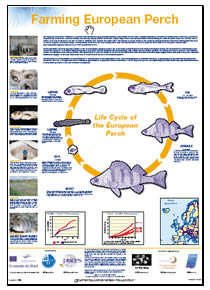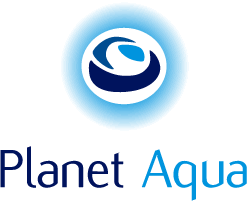

Training News - December 2004
Author: AquaTT
Date: 23 Dec 2004
|
|
A free e-mail news service provided by AquaTT on European Education & Training in Aquaculture.
Please submit any relevant information for dissemination in the newsletter to news@aquatt.ieContents
1. AquaTT in 2004
- Happy Christmas
- PISCES Forum
- Working in Aquaculture; Validation of Experience (WAVE)
- Aquaculture Student Workshop 2004
- e-Aqua Initiative
- Fishing-4-Info Website
- AquaTT Website
2. AquaTT in 2005
- Planet Aqua
- AQUALABS3. Announcements
- Organic Farming, Food Quality and Human Health - Newcastle, UK 6 - 9 January 2005
- Workshop on Project Management in Framework Six - Cambridge, UK 18 January 2005
- Leonardo da Vinci Conference on Valorisation and Quality in Mobility - Oslo, Norway 24 - 25 January 2005- Irish Skipper Expo 05 - Galway, Ireland 11 - 12 February 2005
- Advanced Course: "Design and management of bivalve mollusc hatcheries" - Zaragoza, Spain 14-19 February 2005- Science and Society Forum 2005 - Brussels, Belgium 9 - 11 March 2005
4. Other
- Identification of Research Themes for FP7 - Your Comments Wanted
- Post your Student Placement and MSc/ PhD vacancies on PISCESTTJobs5. Student Corner
- The Aquaculture Sector in Turkiye - Article by Ilhan Yandi, Karadeniz Technical University, Turkey
We express sincere thanks to our directors, project partners and colleagues for their hard work with us through 2004 and wish you all a very Happy Christmas and prosperous 2005.
Best Wishes,David, Erin, Caoimhe and our new member of staff, Lorraine Rafferty (joined in November 2004)
PISCES Forum
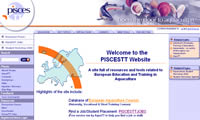
In early 2004, AquaTT completed work on its flagship Leonardo da Vinci funded project, PISCES. PISCESTT, a European Forum for Aquaculture Education and Training, is available at www.piscestt.com. It is host to a comprehensive education information database, interactive games for children, dynamic occupational profiles, virtual tours of existing fish farms, web tools for SMEs and major updates in education and training. The site platform has a multilingual facility with the inbuilt Aqualex glossary of aquaculture and marine science terms. The project led to two spin-off initiatives namely, PISCESTT Jobs and Training News. The newsletter, produced on a monthly basis, is received by more than 2500 persons across Europe and further a field. PISCESTT Jobs, a forum for promotion of mobility and training opportunities, will receive update programming in the New Year.
A central element of the initiative was the production of a series of Educational Posters, comprising nine exciting titles in aquaculture. This first series consists of life-cycle and special interest topic titles posing broad appeal for students from second level upwards, and for those wishing to gain an understanding of the stages and technical methods currently being used within the aquaculture sector.
The life-cycle posters graphically represent the various stages of the wild life cycle of the species through text, graphs, distribution maps and cyclically linked photographs. Each stage of the life cycle is linked to its stage in commercial aquaculture. PISCES partner, La Tene Maps, with pledged support from individuals, development agencies, academic institutions and companies, was responsible for the ultimate design, compilation and production of the series. The funded titles of 2004, currently available in English but with provision for translation are “Farming Atlantic Salmon�, “Farming Turbot�, “Farming European Perch�, “Life-cycle of Seahorse�, “Life-cycle of Sea Bass & Sea Bream�, “Waste Management in Aquaculture�, “Local Area Management Systems in Aquaculture�, “Traceability� and “Recirculation Systems in Aquaculture�.Planning for a second series of Educational Posters is now underway and those interested in discussing sponsorship and/ or contribution options should contact John Coleman at johncoleman@latene.com or Caoimhe Boylan at aquatt@aquatt.ie. The intention is to devise a list of topics, flagged by the industry, and then to work to produce these as comprehensive poster titles through 2005 and 2006. Suggestions may include for example the update and/or reprinting of an existing poster in a different language. Titles currently under discussion include "Farming Cod", "Organic Aquaculture", "Quality Labels", "Depuration Systems", "Mussel Cultivation" and "Life-cycle of the Oyster".
Back to topWorking in Aquaculture; Validation of Experience (WAVE)
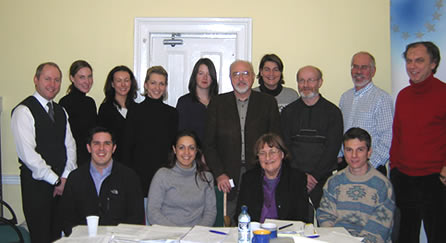
Working in Aquaculture; Validation of Experience (WAVE) - Development and introduction of a Work Experience Validation Protocol in European aquaculture.Skill acquisition in professional aquaculture occurs predominantly outside the scope of accredited university/college tertiary degrees or diplomas. Skills are often acquired through formal certification (vocational) or by informal means (experience-based, workplace assessment, lifelong learning). However, there is no accepted Europe-wide system for validating and accrediting these types of training in aquaculture, impeding fair assessment of an individual’s qualifications, as comparison between countries and their systems is difficult if not impossible. WAVE will provide a solution to this challenge by investigating what the individual knows how to do, by way of a check-list of technical competencies, rather than what they are qualified to do, by way of a course or degree title.
Outputs
- WAVE will produce a comprehensive and definitive list of aquaculture relevant qualifications, including skills, expertise, knowledge requirements and industrial competencies
- WAVE will identify gaps between current qualifications and competencies and training needs for both structured and informal learning within the industry
- WAVE does not try to change, nor compete, with established European systems. Each country understandably has its own courses accredited by its own procedures, many of which are well-founded.
- WAVE does ask each European country to identify its course components and procedures for recognition which will make transparency and comparison possible.
- WAVE will develop a ‘comparison tool’ (protocol), which will be evaluated for acceptance and incorporation within each national scheme, in line with the identified European Commission priorities (Copenhagen Declaration on enhanced European cooperation in Vocational Education and Training (http://europa.eu.int/comm/education/copenhagen/index_en.html)
- WAVE will, by means of the above comparison tool, facilitate the validation and assessment of the training of current workers, new workers, interim staff and students.
- WAVE will give enterprises the opportunity to have better trained staff which should lead to higher efficiency and profits.
- WAVE could feed into the trans-national recognition of qualifications and competenciesBeneficiaries of the WAVE initiative
Example 1: Student on a Work placement - Increasingly, students have to undertake a compulsory work placement on their courses. It is widely accepted that vocational training is a very valuable component of any aquaculture course.
How WAVE helps
WAVE competency lists will enable the farm manager to verify all the competencies the student has acquired during his/her placement.
- Farm managers can structure on-site training
- Students can have a structured plan with aims and targets for the training experience and at the end leave with a full list of what level they have achieved in all aspects of the work experience placement
- Training organisations will know exactly what the placement has achieved and could incorporate the experience into its accreditation system (ECTS or other)Example 2: Farm worker
Every worker has a unique “learning pathway�. It may be a combination of structured courses (degree, diplomas, doctorates etc.) short training courses (1 day, week or month) and lifelong learning (employment, experiences etc.).
How WAVE helps
Every worker is unique, currently it is very hard to compare individuals as they have different qualifications and work experience. But using the WAVE mapping system it will be possible using a competency based approach to identify each individual’s knowledge.
- Farm Managers, when selecting staff, will know exactly what the potential employee can and cannot do; the tool can be used on existing staff to identify training gaps
- Farm Workers will be able to map out their own learning pathwayFor further information on the initiative contact David Murphy at: david@aquatt.ie
The next WAVE Partner Meeting will take place in Athens, Greece 24 – 25 January 2005
Back to top
Aquaculture Student Workshop 2004
2004 saw the successful inaugural launch of the Aquaculture Student Workshop, an AquaTT driven initiative, which took place alongside the Aquaculture International Exhibition in Glasgow, May 19 - 23, 2004. The event drew in 45 participants from 19 different countries, representing a variety of aquaculture-related disciplines of ranging educational levels.
A comprehensive evaluation procedure was built into the workshop, which delivered clear output in terms of the needs and requirements of this young generation of aspiring aquaculturists. Thus, collation and design of three learning modules namely, Fish Health, Traceability in Aquaculture and Marketing Methods is underway. Since its inception, the workshop initiative has been built upon and further strengthened, with a new programme planned for 2005 as part of the AQUALABS Series. If you are interested in getting involved as a speaker or in supporting the event, please contact Caoimhe Boylan at aquatt@aquatt.ieBack to top

e-Aqua Initiative
The e-Aqua project, co-financed by the EC Programme Interreg III B “Atlantic area�, strives to encourage the use of ICT and e-commerce by aquaculture SMEs in order to promote and enhance productivity and competitiveness of the sector. The Irish contingent, Bord Iascaigh Mhara (BIM) and AquaTT, work to gain reliable knowledge on the current level of ICT development amongst Irish aquaculture farmers. The ultimate drive of which is to augment their entrepreneurial skills through provision of key training and useful reference resources. It is anticipated that such action will provide for the identification of new business methods and channels by the farmers. The steps in the project in Ireland include:
- Project questionnaire devised to gauge the levels and types of ICT usage by aquaculture farms in the Atlantic area (partnership)
- Project questionnaire reviewed in terms of Irish context (BIM & AquaTT)
- Phased carrying out of the questionnaires & interviews (BIM)
- Collation of the completed questionnaires and presentation of summary results and conclusions for Ireland (BIM & AquaTT)
- Establish a viable pilot-scale training plan (BIM & AquaTT)
- Consult with the trainees/ farm managers via the actual training activities, which will provide feed forward for devising of e-strategy/ e-tools for implementation in the respective sectors (BIM & AquaTT).
The survey results and report, together with information on the initial training workshops held in Ireland, can be found in the "Regional Info" section of the project website: http://www.e-aqua.org
Back to top
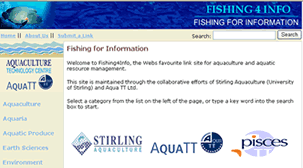
Fishing-4-Info Website
Fishing-4-Info, a comprehensive link site for all aquaculture and aquatic resource management contacts is available at http://www.fishing4info.com. The site is maintained through the collaborative efforts of Stirling Aquaculture (University of Stirling) and AquaTT.
Back to top
AquaTT Website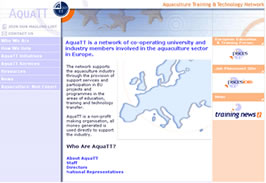
The newly updated AquaTT website was launched during the summer of 2004. The site, found at www.aquatt.ie, with a project archive database, contains information on all current initiatives and actions that AquaTT are involved in. Among the new features programmed into the site are a:
- Discussion Forum
- Comprehensive Links Database
- Photo Gallery
- Training News Archive Facility
Planet Aqua
Planet Aqua, an Irish focused initiative, endeavours to inspire and encourage young people to appreciate the environmental and scientific importance of conserving and preserving the planet's water habitats and resources, and in doing so, inspire them to action in their lives to minimise their inidividual ecological footprints. To find out more about this new, exciting initiative log onto www.planetaqua.ie in the New Year.
Back to top
AQUALABS
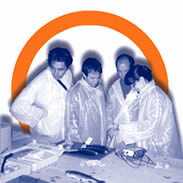
Contracting is currently underway with the European Commission under the Marie Curie Action for a series of six state-of-the-art training courses and one supporting student workshop, fulfilling the following objectives:• Provision of advanced practical laboratory training for early-stage researchers in the major topical themes of
- Quality in Fish Products (Cork, IRELAND 2005)
- Molecular Biology and Ecology (Kuopio, FINLAND 2005)
- Design & Operation of Recirculation Technologies (Wageningen, THE NETHERLANDS 2006)
- Freshwater Aquaculture and the Environment (Szarvas, HUNGARY 2005)
- Aquatic Animal Disease Diagnostics (Stirling, UK 2006)
- Fish Welfare (Varese, ITALY 2005)• Provision for the acquisition of practical skills and critical field work experience in themes with specific tie into 6FP interest areas (environment, ethical production, food safety and traceability)
• Promote mobility of researchers from an early stage through key linkages and training programmesBuilding on the strength of the initial Aquaculture Student Workshop, it is proposed that the AQUALAB Student Workshop will take place alongside the prominent industry trade-show Aqua Nor, with the following focal objectives:
• Examine scientific content relevant to course title; leading to prediction of future needs
• Review of current and potential future research issues
• Provision of multi-disciplinary training for the acquisition of non-research competencies (e.g. communicating science to non-scientists) through presentations, team work and networking events
• Provision of a forum for early-stage researchers to develop synergies, engage in collaboration and debate on issues of specific interest within the ERAEach training course and the concomitant workshop will consist of a 3-phase work programme:
1. Preparatory Phase – centralised internet based system linking all the research participants prior to attendance at the individual events; providing background information and tasks through the online forum
2. Training Phase – five to seven days of intensive training consisting of lectures, practical work and field studies
3. Sustainability – post-event electronic forum for continued networking and collaboration of researchers
Updates on this initiative will be available through Training News and on the AquaTT website
Back to top
Organic Farming, Food Quality and Human Health - Newcastle, UK 6 - 9 January 2005
An international congress on organic farming, food quality and human health will take place in Newcastle upon Tyne in the UK from 6 to 9 January 2005. The overall aim of the event is to disseminate information about ongoing research, and to provide a platform for discussions on future research on organic farming. Indeed, researchers involved or interested in agricultural research are urged to attend and to contribute to discussions on the Seventh Framework Programme (FP7) . The congress is being organised by the leaders of the EU funded project Quality Low Input Food (QLIF) and the UK's Soil Association, which promotes and certifies organic food. A number of high level politicians from both the European Union and its Member States are expected to participate in the conference.Data Source: Cordis
For further information visit: http://www.qlif.org and for the programme: http://www.qlif.org/forum/conf1/first/conference.pdf
Back to topWorkshop on Project Management in Framework Six - Cambridge, UK 18 January 2005
Singleimage Limited will be running a workshop on Project Management in Framework Six on Tuesday 18 January 2005 in Cambridge, UK.Data Source: Cordis
Back to topLeonardo da Vinci Conference on Valorisation and Quality in Mobility - Oslo, Norway 24 - 25 January 2005
The Norwegian Leonardo da Vinci National Agency, in cooperation with the National Agencies in Austria, The Czech Republic, Hungary, Iceland, Lithuania, The Netherlands, and Sweden, invites you to the conference on valorisation and quality in mobility. The conference is taking place at Holmenkollen Park Hotel in Oslo, Norway, 24-25 January 2005.Quality has been put forward as a priority area in the Leonardo da Vinci programme and was followed up by a transnational working group lead by the National Agency in Austria. The group tried to grasp the meaning of quality in mobility projects by pointing out a set of quality aspects. As a result of this theoretical work, several countries have introduced national Quality in Mobility Awards. The awareness of Quality in Mobility has grown substantially in all countries, and it has become an ordinary part of the vocabulary of the National Agencies. It has also had an impact on the application form and reports in the programme, and promoters have to act in accordance with the new requirements.
‘Valorisation’ is the latest introduced priority area in the Leonardo da Vinci programme. It is a concept that to a large extent has evaded the mobility side of the programme, for the simple reason that the results of mobility projects seldom can be catalogued or exposed as robust, concrete ‘products’, ready to be exploited by other potential new users. The processes around developing, managing and executing mobility projects, however, can be exposed and rendered visible. In some cases, there are also ‘products’ emerging as ‘accessories’ to these processes.
The themes of the conference are valorisation and quality in relation to mobility projects. These themes should be of interest to everyone working with internationalisation of vocational training and education. The objectives of the conference are several, of which the following are some of the main ones:
- What is quality in a mobility project? Can the whole notion of quality be grasped with a fixed set of criteria? Are the criteria used and presented today well-suited for the future running of good Leonardo da Vinci mobility projects?
- How should “valorisation� be understood when it comes to mobility projects?
- In what way can “quality in mobility� best be linked to “valorisation�?
- Do the views and understanding of quality and valorisation in mobility projects vary between project promoters, policymakers and end users?
In addition, the conference will be a unique occasion for the participants to meet potential partners with the same interest in conducting good mobility projects. At the end of the conference, the Leonardo da Vinci Quality in Mobility Award will be presented to four excellent mobility projects. The different Leonardo da Vinci National Agencies in Europe have nominated a total of 70 mobility projects from the contract years of 2000, 2001, and 2002 (17 IVT, 18 INST/LANG, 19 Work and 16 STU). The five projects obtaining the best scores in each target group will be invited to the event, and their projects will be exhibited as good examples.
The Conference fee is 150 euro for participants coming from outside of Norway and includes hotel accomodation 23-25 January (2 nights). The Conference fee is 200 euro for participants from Norway and includes hotel accomodation 24-25 January (1 night).
DEADLINE FOR REGISTRATION: 15 January 2005
Data Source: Leonardo da Vinci National Agency, Ireland
Back to top
Training Course on the Fundamentals of International Project Management - Karlsruhe, Germany 3 - 4 February 2005
EARMA, the European Association of Research Managers and Administrators, and Forschungszentrum Karlsruhe jointly offer a training course on the Fundamentals of International Project Management. The course will take place in Karlsruhe, Germany, from 3 - 4 February 2005.Data Source: Cordis
For further information visit:http://dbs.cordis.lu/cordis-cgi/srchidadb?ACTION=D&SESSION=&DOC=1&TBL=EN_RTDN&RCN=EN_RCN_ID:2574&CALLER=CORDISwire
Back to topIrish Skipper Expo '05 - Galway, Ireland 11 - 12 February 2005
The Irish Skipper marine industry magazine, is pleased to announce the launch of a new fishing industry exhibition. With an emphasis on the fishing operations of vessels under 20m, Irish Skipper Expo 05 , which is co-sponsored by BIM and AIB, will be an all-encompassing display of a full range of products and services available to the mid-range and inshore sectors. From punts to potters/netters, jiggers and longliners and from mussels/scallop dredgers to trawlers, Irish Skipper Expo 05 will have on show a wide variety of service providers and manufacturers covering the areas of vessel design & construction, marine engines and hydraulic systems, deck equipment, electronics, fishing gear, safety equipment and protective clothing. To offer visitors to the exhibition a complete programme of events covering the inshore sector, BIM will be holding a series of workshops and discussions on a wide range of activities currently taking place in the inshore sector.
Irish Skipper Expo 05 will be held in the Corrib Great Southern Hotel, less than 2km from Galway City, on February 11 & 12th, 2005.
For further information contact:
Hugh Bonner. Tel: 00353 (0) 74 9548935 Email: hbonner@iol.ie
Sharon Boyle. Tel:00353 (0) 74 9548037 Email: smboyle@iol.ie
Back to topAdvanced Course: "Design and Management of Bivalve Mollusc Hatcheries - Zaragoza, Spain 14 - 19 February 2005
The course is organized by the International Centre for Advanced Mediterranean Agronomic Studies (CIHEAM), through the Mediterranean Agronomic Institute of Zaragoza (IAMZ), with the collaboration of the Food and Agriculture Organization of the United Nations (FAO), through the Fisheries Department, and will take place at the Mediterranean Agronomic Institute of Zaragoza. The course will be given by well-qualified lecturers from international organizations and research centres, administration and private companies from different countries.The course, designed for producers, technical advisors and researchers, will present the current state of knowledge, covering biological and technical aspects of bivalve hatcheries and nurseries from an applied angle. Attention will be paid to the opportunity that exists in nursery facilities in areas where a hatchery may not yet be required. The presentation of specific examples will provide participants with a perspective of the functioning of hatcheries from experimental to commercial scale.
For further information visit:
ENGLISH: http://www.iamz.ciheam.org/ingles/criamoluscos-05-pub-ing.htm
FRENCH: http://www.iamz.ciheam.org/frances/criamoluscos-05-pub-fra.htm
SPANISH: http://www.iamz.ciheam.org/espanol/criamoluscos-05-pub-esp.htm
Back to topBiotechnology for Characterisation Workshop - Turin, Italy 5 - 7 March 2005
A workshop on 'the role of biotechnology for the characterisation and conservation of crop, forestry, animal and fishery genetic resources will take place in Turin, Italy, from 5 to 7 March. The event will include sessions on: the status of the world's agro-biodiversity; the use of biotechnology for conservation of genetic resources; genetic characterisation of populations and its use in conservation decision making.Data Source: Cordis
Back to topScience and Society Forum 2005 - Brussels, Belgium 9 - 11 March 2005
Registration is now open for the Science and Society Forum 2005, the major Commission conference in the field of science and society interaction, which will be held in Brussels, Belgium from 9 to 11 March 2005. The event will review efforts to stimulate a deep-seated dialogue between the scientific community and society at large, and plot a new course forward in the form of a Charter on the future of science in society.
The conference is expected to attract between 500 and 600 delegates and will explore four main themes:
- science and society and the Lisbon strategy;
- science, technology and democracy;
- towards a common culture of communication of science in society;
- fostering diversity and inclusiveness in research.Data Source: Cordis
For further information visit: http://europa.eu.int/comm/research/conferences/2005/forum2005/index_en.htm
Back to top
Identification of Research Themes for FP7 - Your Comments Wanted
The European Commission has recently issued an invitation to stakeholders to identify Research Themes to be included in FP7. Submissions are invited on-line and must be input on or before 31st December 2004:
<http://europa.eu.int/comm/research/future/themes/comments_en.cfm>
The statistics generated from this exercise will be used by the Commission in its negotiations with Member States to select / disgard Themes to be included in FP7. It is essential, therefore, that there be a good statistical return in favour of Marine Research from this on-line consultation. For example you could insert "Marine Research" in the box entitled "Other areas not covered in the Sixth Framework Programme" when filling out the online questionnaire. We would encourage that you go further and complete the Comments Box outlining the specific issues you would like to see addressed under a Marine Research Programme.
A detailed scope and rationale, prepared by Ireland, Portugal and Norway, titled "The OCEANs and FP7" can be downloaded (shortly) from www.EUROCEAN.ORG. You are invited to use all or parts of this text in (a) making your own on-line submission and (b) encouraging your National Authorities to consider Marine Research as one of their Priorities for FP7:
EU 7th Framework Programme - Building the European Marine Research Area
The sustainable development of Europe's marine resources, encompassing some 50% of the European territorial space, represents a continuing and outstanding challenge for the European Union and its Member States. Marine research can and must play a critical role in the sustainable development of European marine resources and in supporting European development policies as they pertain to the marine sector, for example with respect to regional development, transport, energy, fisheries and aquaculture, healthy food, mineral resources and recreation. Marine science and technology has an essential role to play in generating the knowledge and technologies needed to fuel economic development as outlined in the Lisbon Agenda. The seas and oceans play a critical role in climate, carbon cycle and ecosystem function, the understanding of which is essential to the implementation of European policies on sustainable development and environmental protection (Gothenburg Agenda).Marine science and technology must therefore be included as one of the strategic orientations of European Science Policy and implemented through the 7th Framework Programme. Marine research meets all three criteria identified by the Commission for inclusion in FP7. It contributes to EU policy objectives, it represents significant potential for excellence in science and technology, contributes to social, environmental and economic goals and has a strong European added-value aspect bringing together existing European expertise to form the critical mass needed to address multidisciplinary and regional issues and challenge our major maritime competitors (USA, Japan).
Given the broad range of topics, themes and priorities relevant to the marine sector (see above) and the need to develop and apply a broad range of new and innovative technologies (bio, nano-technologies, acoustics, ICT, etc), attempts to include all of these in a single FP7 Theme or Priority is problematical. The success of a European Marine Research initiative will, therefore, depend upon a holistic implementation of actions across the various Axes (Pillars) and Priority Themes of FP7, in other words:
"marine science must be introduced as an innovative horizontal element spanning all 6 pillars and priority themes of the proposed 7th Framework Programme".
Data Source: Marine Institute Ireland
Back to topPost your Student placement and MSc/ PhD vacancies on WWW.PISCESTTJOBS.COM
PISCES TT Jobs, an exciting and valuable free online service provided by AquaTT UETP Ltd. to employers and potential employees in aquaculture and related science sectors. Using a secure and innovative site format, employers and job searchers can post job vacancies and CVs, respectively, thus facilitating human resource development in the industry.
Upon registration, companies can post and instantaneously edit job vacancies, including permanent, temporary, MSc/PhD and student placement positions. Companies will only receive CVs of those applicants who are qualified for the position requirements. To ensure privacy and lessen the hassle of unsolicited calls and queries, company/organisation contact details will not be published online.
Prospective employees can use the online registration facility to obtain a username and password, post and edit their employee profile, upload a CV and apply online for positions.
If you are interested in posting a job vacancy or registering for the service, please contact aquatt@aquatt.ie
AquaTT, the European Network for Education and Training, is providing the site as an additional service to compliment their flagship project, PISCES TT, found on the web at www.piscestt.com and host to a comprehensive education database, occupational profiles, virtual tours, a discussion forum, and marine sciences activities for children.
Back to top
The Aquaculture Sector in Turkiye

by Ilhan Yandi, Karadeniz Technical University, TurkeyThe aquaculture sector in Turkey has enjoyed rapid development during the last decade with full public support, cheap labor and lack of strict environmental regulations. Production has reached over 60,000 tons/year from around one thousand farms producing rainbow trout, seabass, seabream, tuna and common carp. Its share in total fishery production is around 10-12% in volume and around 25% in value terms. Currently, the country has a significant know-how and research capacity, although it is not well organised. R&D activities are mainly performed by Fisheries Faculties, Research Institutes and Production Development Centres of the Ministry of Agriculture and Rural Affairs. There are 13 fisheries faculties and 5 departments at agriculture faculties providing undergraduate and graduate education in fisheries (including aquaculture) and aquatic sciences. Each year more than 300 students graduate from these faculties, but the numbers employed by the sector are very limited, mainly in marine aquaculture. Aquaculture producers have recently started organising themselves and formed three associations, one fisheries foundation and one fish promotion group.
Lack of natural resource management, the system, low species and product diversity, insufficient legal and institutional structures, quality and utilisation of manpower, organisation of research and development activities, dissemination of research results and partnerships between stakeholders, producer associations and public institutions seems to be the major constraints for development of environmental sustainability, food safety and industry competitiveness.
Turkiye is a large country with a size of about 779,452 square kilometers and a relatively young population approaching 70 million, which is increasing at around 2 percent a year. The country has rich and diverse water sources ranging from fresh to brackish and marine: 8,333km of coastline, 151,080 square kilometers economic coastal zone, 177,714 km total river length, around 900,000 ha natural lakes, 500,000 ha of dam reservoirs. Despite these large resources, Turkish fisheries has stagnated at annual production of around 600,000 tons and depends mainly on small-scale and largely small pelagic. Freshwater fisheries production has also leveled off at around 40,000-50,000 tons.
Similar to global trends, demand for fish is increasing in Turkiye. As the landings of fish from capture fisheries fail to meet the demand, the role of aquaculture is increasing and it has become an important and viable sector with an average annual increment of over 30% in the last 10 years. Currently the government of Turkiye is committed to ensuring the responsible and sustainable development of the aquaculture industry. Recent efforts on relationships with international organisations, legal arrangements such as environmental impact assessment (EIA), direct income support for fish farms are clear expression of this commitment. The major objective is to support the sustainable development of the aquaculture sector, with a focus on increasing production and diversity, enhancing public confidence in the sector and improving the industry’s competitiveness.
If you would like to write an article for the student corner please contact Caoimhe at aquatt@aquatt.ie
Back to top
AquaTT through its extensive network has realised that essential information on upcoming changes is not being effectively disseminated to all parties. Thus, AquaTT is producing this free news service "TRAINING NEWS" specifically for the Aquaculture industry. The newsletter is intended to keep you informed of developments in Education & Training and related areas. Support material will be available on the new European Education Forum website www.piscestt.com . All old Training News will be archived on the piscestt site.
The main target audience for this newsletter is teachers, trainers and students in the aquaculture area but will also be of interest to policy makers, companies and associations.
AquaTT welcomes any feedback regarding content, presentation and user-friendliness of the newsletter. Please forward this mail to any colleagues that may be interested. Please submit any relevant information for dissemination in the newsletter.
DISCLAIMER: AquaTT provides this newsletter as a free service to interested parties. Most of the information is provided by AquaTT. Where it is not, the source of the news is provided in the text of the news brief or else AquaTT attributes the news to the coordinating body as the "Data Source Provider". In no way does this newsletter, by promoting events not coordinated by AquaTT, intend to wrongly or inappropriately claim projects, news, etc. as its own nor is it responsible for incorrect information provided from other sources. "Training News" is a promotional tool and forum for both AquaTT and other organisations.
Back to top




